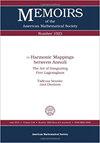On Fusion Systems of Component Type
IF 2.4
4区 数学
Q1 MATHEMATICS
引用次数: 13
Abstract
Introduction. This series of lectures involves the interplay between local group theory and the theory of fusion systems, with the focus of interest the possibility of using fusion systems to simplify part of the proof of the theorem classifying the finite simple groups. For our purposes, the classification of the finite simple groups begins with the GorensteinWalter Dichotomy Theorem (cf. [ALSS]) which says that each finite group G of 2-rank at least 3 is either of component type or of characteristic 2-type. This supplies a partition of the finite groups into groups of odd and even characteristic, from the point of view of their 2-local structure. We will be concerned almost exclusively with the groups of odd characteristic: the groups of component type. However Ulrich Meierfrankenfeld’s lectures can be thought of as being concerned with the groups of even characteristic. In the case of a saturated fusion system F , the situation vis-a-vis the GorensteinWalter dichotomy is nicer: F is either of characteristic p-type or component type, irrespective of rank. Further the Dichotomy Theorem for saturated fusion systems is much easier to prove than the theorem for groups; indeed once the notion of the generalized Fitting subsystem F ∗(F) of a saturated fusion system F is put in place, and suitable properties of F ∗(F) are established, including E-balance, the proof of the Dichotomy Theorem for fusion systems is easy. But of more importance, it seems easier to work with 2-fusion systems of component type than with groups of component type. This is because in a group G of component type, a 2-local subgroup H of G may have a nontrivial core, where the core of H is the largest normal subgroup O(H) of H of odd order. The existence of these cores introduces big problems into the analysis of groups of component type. These problems can be minimized if one can prove the B-Conjecture, which says that, in a simple group,论组件型融合系统
介绍。本系列讲座涉及局部群论与融合系统理论之间的相互作用,重点关注利用融合系统简化有限简单群分类定理的部分证明的可能性。为了我们的目的,有限简单群的分类从GorensteinWalter二分定理(参见[ALSS])开始,该定理表明每个2-秩至少为3的有限群G要么是成分型,要么是特征2型。从有限群的二局部结构出发,给出了将有限群划分为奇偶特征群的一种方法。我们将几乎只关注奇数特征群:成分类型群。然而,乌尔里希·梅尔弗兰肯菲尔德的讲座可以被认为是与偶数特征的群体有关。在饱和聚变系统F的情况下,相对于GorensteinWalter二分法的情况更好:F要么是特征p型,要么是成分型,与秩无关。此外,饱和融合系统的二分定理比群的二分定理更容易证明;事实上,一旦饱和融合系统F的广义拟合子系统F * (F)的概念被引入,并且F * (F)的适当性质(包括E-balance)被确立,融合系统的二分定理的证明就很容易了。但更重要的是,使用组件类型的2融合系统似乎比使用组件类型的组更容易。这是因为在分量型群G中,G的二局部子群H可能有一个非平凡核,其中H的核是H的奇阶最大正规子群O(H)。这些核心的存在给构件类型群的分析带来了很大的问题。如果能证明b猜想,这些问题就能最小化,b猜想说,在一个简单群中,
本文章由计算机程序翻译,如有差异,请以英文原文为准。
求助全文
约1分钟内获得全文
求助全文
来源期刊
CiteScore
3.50
自引率
5.30%
发文量
39
审稿时长
>12 weeks
期刊介绍:
Memoirs of the American Mathematical Society is devoted to the publication of research in all areas of pure and applied mathematics. The Memoirs is designed particularly to publish long papers or groups of cognate papers in book form, and is under the supervision of the Editorial Committee of the AMS journal Transactions of the AMS. To be accepted by the editorial board, manuscripts must be correct, new, and significant. Further, they must be well written and of interest to a substantial number of mathematicians.

 求助内容:
求助内容: 应助结果提醒方式:
应助结果提醒方式:


